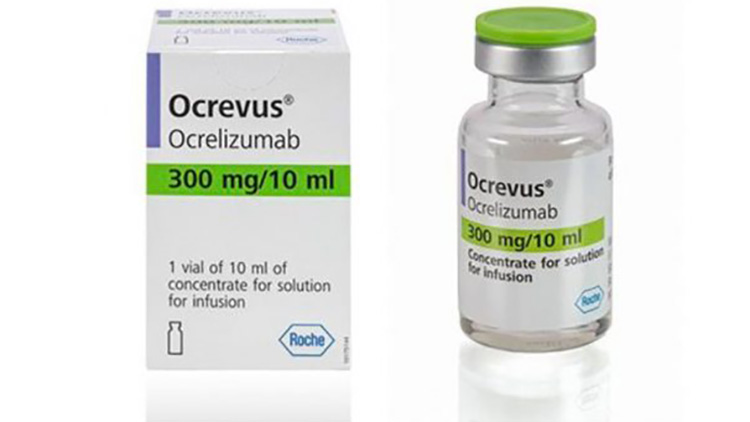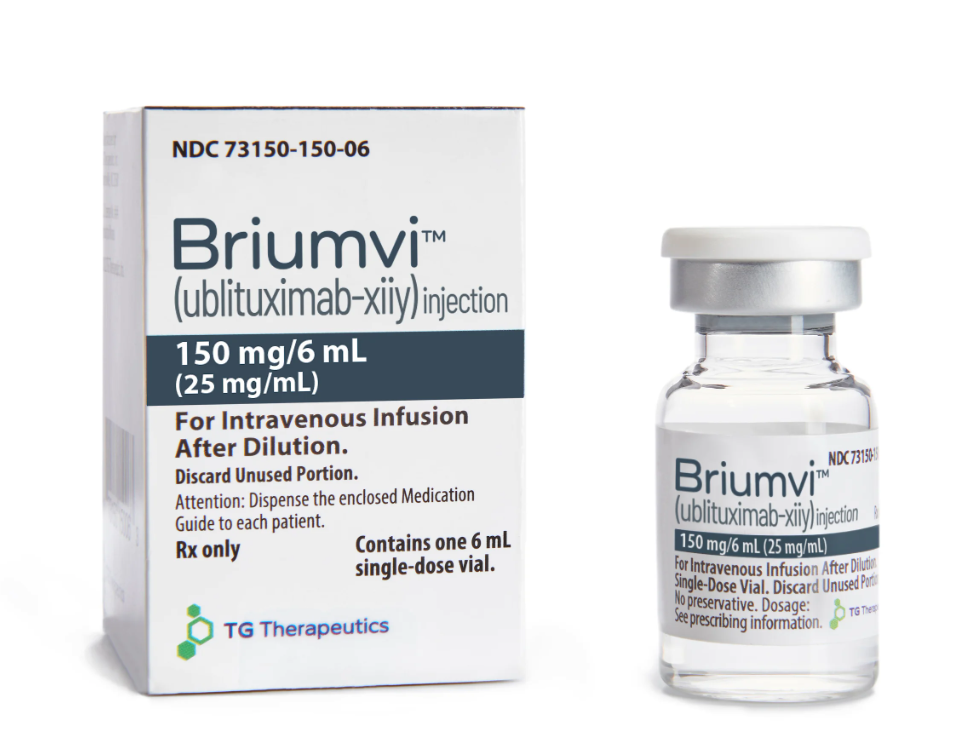Ocrevus (ocrelizumab) vs Briumvi (ublituximab-xiiy)
Ocrevus (ocrelizumab) vs Briumvi (ublituximab-xiiy)
Ocrevus (ocrelizumab) and Briumvi (ublituximab-xiiy) are both monoclonal antibodies used to treat multiple sclerosis (MS), but they target different molecules on immune cells. Ocrevus is directed against CD20-positive B cells and is approved for both relapsing-remitting MS (RRMS) and primary progressive MS (PPMS), offering a broad indication for various MS subtypes. Briumvi, on the other hand, targets a unique epitope on CD20 and is specifically approved for relapsing forms of MS, including RRMS and active secondary progressive MS; it is designed for a rapid infusion time, which may be a consideration for patients when deciding on treatment.
Difference between Ocrevus and Briumvi
| Metric | Ocrevus (ocrelizumab) | Briumvi (ublituximab-xiiy) |
|---|---|---|
| Generic name | Ocrelizumab | Ublituximab-xiiy |
| Indications | Primary Progressive Multiple Sclerosis (PPMS), Relapsing forms of Multiple Sclerosis (RMS) | Relapsing forms of Multiple Sclerosis (RMS) |
| Mechanism of action | CD20-directed cytolytic antibody | CD20-directed cytolytic antibody |
| Brand names | Ocrevus | Briumvi |
| Administrative route | Intravenous infusion | Intravenous infusion |
| Side effects | Infusion reactions, infections, skin reactions, etc. | Infusion reactions, infections, headaches, fatigue, etc. |
| Contraindications | Active hepatitis B infection, history of life-threatening infusion reaction to ocrelizumab | Active hepatitis B infection, history of life-threatening infusion reaction to ublituximab-xiiy |
| Drug class | Monoclonal antibody | Monoclonal antibody |
| Manufacturer | Genentech (Roche) | TG Therapeutics |
Efficacy
Ocrevus (Ocrelizumab) Efficacy in Treating Multiple Sclerosis
Ocrevus (ocrelizumab) is a monoclonal antibody designed to target CD20-positive B cells, which are believed to play a key role in the pathogenesis of multiple sclerosis (MS). The efficacy of Ocrevus in treating MS has been demonstrated in several clinical trials, including the OPERA I and II studies for relapsing forms of MS (RMS), and the ORATORIO study for primary progressive MS (PPMS). In the OPERA studies, Ocrevus was shown to significantly reduce the annualized relapse rate by nearly half compared to interferon beta-1a, a commonly used MS therapy. Additionally, Ocrevus demonstrated a reduction in disability progression and MRI-detected disease activity.
In the ORATORIO study, which focused on PPMS, a form of MS characterized by steady progression without relapses, Ocrevus was the first therapy to show efficacy in slowing disease progression. Patients treated with Ocrevus had a significantly lower risk of progression of clinical disability compared to those receiving placebo. This marked a significant milestone, as treatment options for PPMS have historically been limited. The findings from these studies have established Ocrevus as an important treatment option for both relapsing and primary progressive forms of MS.
Briumvi (Ublituximab-xiiy) Efficacy in Treating Multiple Sclerosis
Briumvi (ublituximab-xiiy) is another monoclonal antibody that targets CD20-positive B cells, similar to Ocrevus. It has been studied for its efficacy in treating relapsing forms of multiple sclerosis (RMS). Clinical trials, including the ULTIMATE I and II phase 3 studies, have evaluated the efficacy of Briumvi in reducing the annualized relapse rate in comparison to teriflunomide, another MS medication. The results from these studies indicated that Briumvi significantly reduced the annualized relapse rate compared to teriflunomide, providing evidence of its potential as an effective treatment for RMS.
Additional measures of efficacy, such as the number of T1 gadolinium-enhancing lesions and new or enlarging T2 lesions on MRI, also favored Briumvi over teriflunomide. These findings suggest that Briumvi could offer a promising new option for patients with RMS, particularly for those who seek an alternative to existing therapies. As with any medication, the efficacy of Briumvi must be considered alongside its safety profile and the individual patient's medical history and treatment preferences.
Regulatory Agency Approvals
Ocrevus
-
European Medical Agency (EMA), European Union

-
Food and Drug Administration (FDA), USA

-
Health Canada

-
Therapeutic Goods Administration (TGA), Australia

-
Medsafe (NZ)

Briumvi
-
European Medical Agency (EMA), European Union

-
Food and Drug Administration (FDA), USA

Access Ocrevus or Briumvi today
If Ocrevus or Briumvi are not approved or available in your country (e.g. due to supply issues), you can access them via Everyone.org.
How it works

Make an enquiry
Choose the medicine you want to buy, answer a couple of questions, and upload your prescription to speed things up. We’ll get back to you within 24 hours.


Make an enquiry
Choose the medicine you want to buy, answer a couple of questions, and upload your prescription to speed things up. We’ll get back to you within 24 hours.


Breeze through the paperwork
We'll guide you through the required documents for importing unapproved medicine, ensuring you have all the necessary information.


Get a personalized quote
We’ll prepare a quote for you, including medicine costs and any shipping, administrative, or import fees that may apply.


Receive your medicine
Accept the quote and we’ll handle the rest - sourcing and safely delivering your medicine.

Some text on this page has been automatically generated. Speak to your physician before you start a new treatment or medication.
Let's talk
If you have any questions, call us or send us a message through WhatsApp or email:
Contact us




